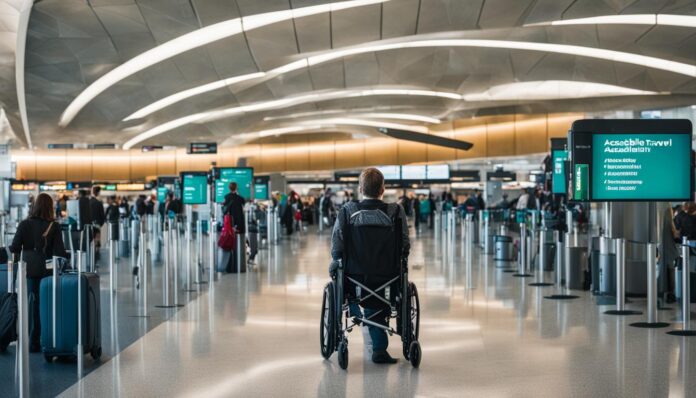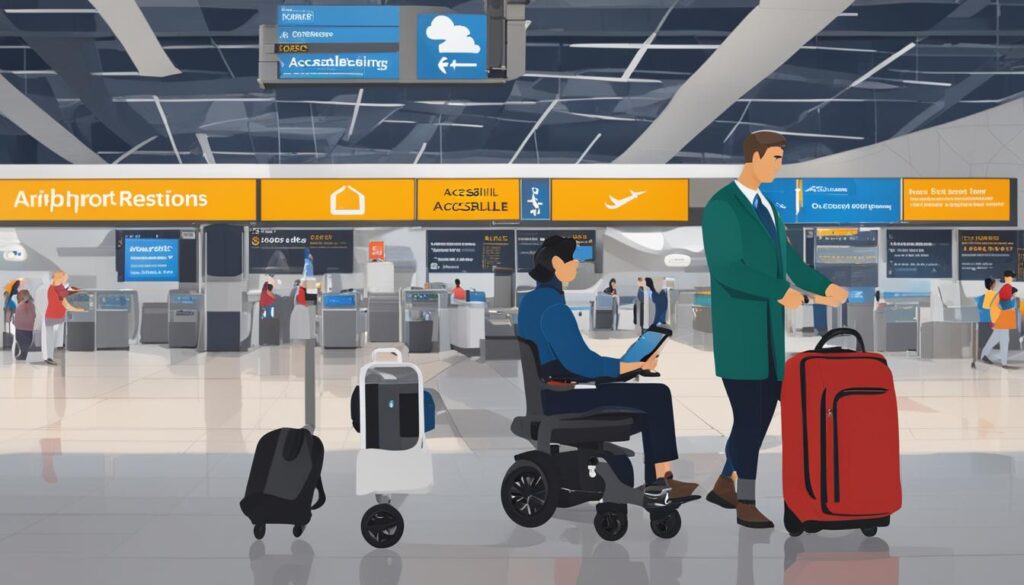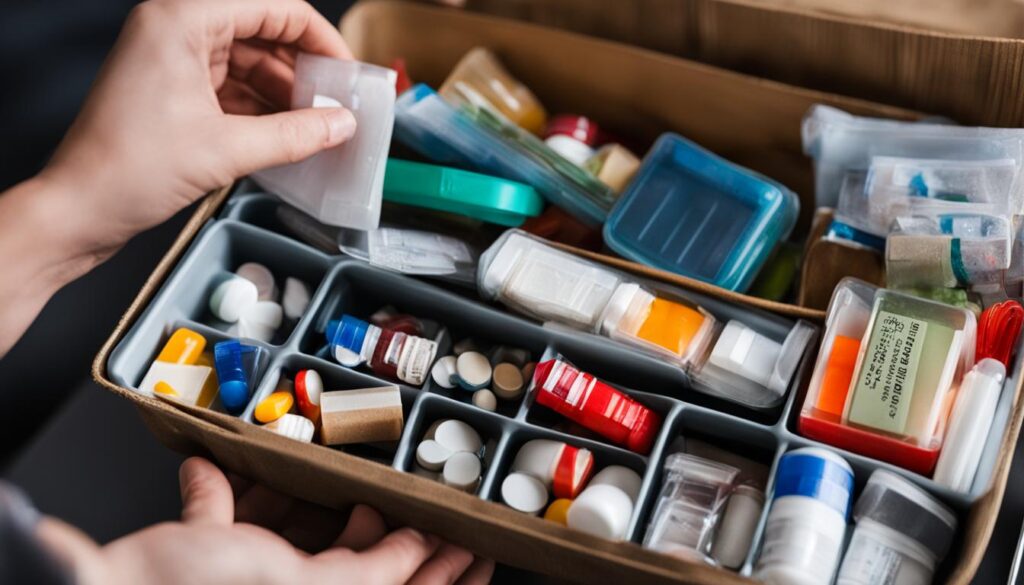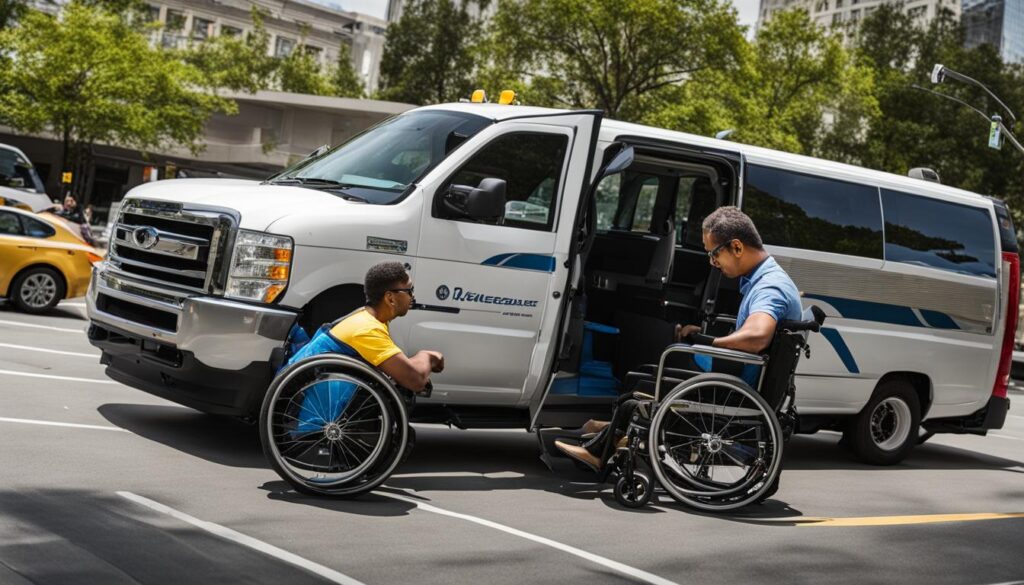Traveling with a disability requires careful planning and consideration of your unique health needs. Whether you’re embarking on a road trip, flying across the country, or exploring a new destination, it’s essential to prioritize your health and safety throughout your travels.
In this section, we will provide you with valuable travel health tips, specifically tailored for people with disabilities. From choosing disabled-friendly destinations to staying active and healthy on the road, these tips will help you ensure a successful and enjoyable journey.
As you plan your next adventure, keep these travel health tips in mind to make the most out of your trip. Discover the best-disabled friendly destinations that prioritize accessibility and inclusivity, and learn how to manage your medications and medical supplies while on the road. With the right preparation and resources, you can create lasting memories and embark on worry-free journeys.
Let’s explore the essential travel health tips for people with disabilities and discover new ways to make your travel experience seamless and inclusive.
Understanding Your Unique Needs
When traveling with a disability, it’s essential that you understand your unique needs and take into account potential health considerations. By doing so, you can ensure a safe and enjoyable journey that meets all of your needs.
One of the most important factors to consider is the level of accessibility at your chosen destination. Some destinations may be more accommodating to disabled travelers than others. Do your research to find out which destinations offer the most accessible options for transportation, accommodations, and attractions.
Another consideration is any necessary medical equipment or supplies that you may need. It’s important to plan ahead to ensure that you have enough of these items for the duration of your trip. You may also need to make arrangements to rent or borrow equipment at your destination.
In addition, you should take into account any medical conditions or disabilities that may impact your travel experience. Consulting with your healthcare provider before your trip is essential to ensure that you are prepared and have appropriate care plans in place.
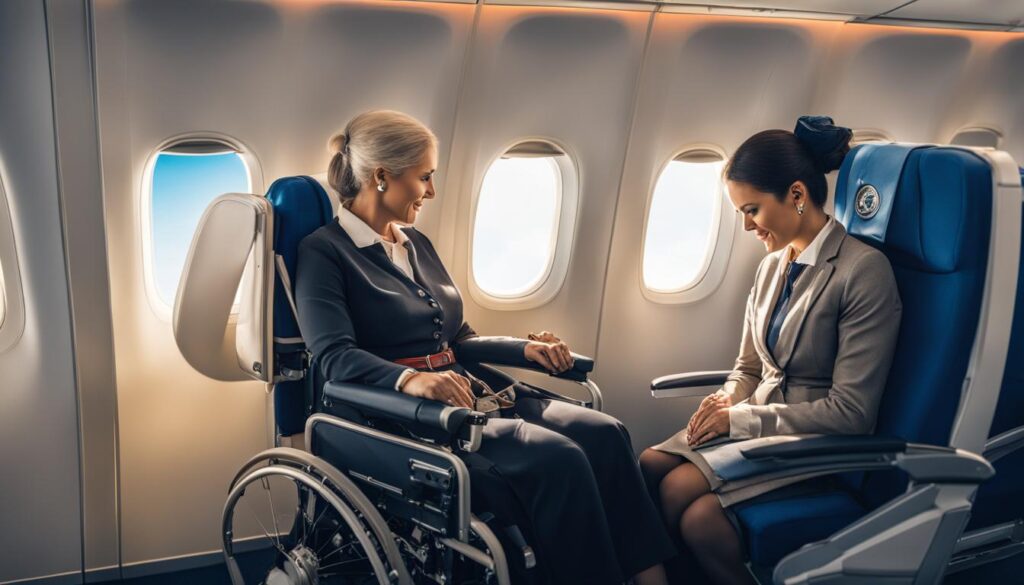
Remember to be proactive about your health and safety while traveling. This may include staying hydrated, taking frequent breaks to rest, and having a plan in place for emergency medical situations.
By taking these factors into account, you can enjoy a safe and inclusive travel experience that meets all of your unique needs.
Disabled-Friendly Destinations
If you’re looking for a stress-free travel experience, choosing a disabled-friendly destination is a great way to start. These destinations prioritize accessibility and inclusivity, ensuring that travelers with disabilities have the support and resources they need to enjoy their trip fully.
There are many great disabled-friendly destinations around the world. Here are some recommendations:
| Destination | Wheelchair Accessible Accommodations | Disability-Friendly Transportation | Accessible Attractions |
|---|---|---|---|
| New York City, USA | Yes | Yes | Yes |
| Amsterdam, Netherlands | Yes | Yes | Yes |
| Sydney, Australia | Yes | Yes | Yes |
| Toronto, Canada | Yes | Yes | Yes |
| London, UK | Yes | Yes | Yes |
These destinations offer wheelchair accessible accommodations, disability-friendly transportation, and various accessible attractions to make your travel experience seamless. In addition, many tourist attractions are equipped with ramps, accessible restrooms, and other amenities that are necessary for disability travelers.
However, it’s important to note that accessibility levels can vary widely from city to city and even from attraction to attraction within the same city. In preparation for your trip, we recommend researching accessibility information for each destination and attraction you plan to visit.
When booking accommodations and transportation, be sure to inform the provider of any special needs or requests you may have. This will allow them to adequately prepare for your arrival and ensure a more comfortable and enjoyable trip.
With these disabled-friendly destinations, you can rest assured that accessibility won’t be a barrier to your adventure.
Pre-Travel Health Preparations
Proper health preparations are essential before embarking on any trip, especially for people with disabilities. Following these essential steps will ensure a safer, more comfortable journey:
- Consult with your healthcare provider: Before traveling, make an appointment with your healthcare provider to discuss any necessary health considerations and to ensure you are fit to travel. You may also need to obtain any necessary vaccines or medical clearances specific to your travel destination.
- Organize necessary medications and documents: Ensure you have enough medications for the duration of your trip, including any backups in case of emergencies. Also, make sure you have all the necessary documents, such as medical records, prescriptions, and doctor’s notes, to avoid any complications during your travels. Store them in a safe, easily accessible place.
- Research accessible healthcare resources: It’s essential to research accessible healthcare resources at your travel destination. Find out the locations of the nearest hospitals and clinics, ensure they have the necessary equipment and staff for any potential emergencies, and check if they accept your insurance. You may also want to research accessible pharmacies and medical supply stores in case you need to purchase additional medical items while on the road.
By following these pre-travel health preparations, you can begin your journey with peace of mind, knowing you have taken all necessary steps to ensure your safety and well-being.
Managing Medications and Medical Supplies
When traveling with a disability, managing your medications and medical supplies is crucial for your wellbeing. Without proper management, you may find yourself in a difficult situation if you run out of necessary medication or lose your medical supplies.
Here are some tips to help you manage your medication and supplies:
- Pack your medication safely: Store your medication in a labeled, sturdy container, and place it in your carry-on bag. This will help prevent breakage or loss, and ensure you have immediate access to it during your travels.
- Bring an adequate supply: Pack extra medication to account for any travel delays or unexpected needs, and make sure to bring all necessary medical supplies, such as insulin needles or catheters.
- Carry a doctor’s note: To avoid any potential issues with airport security, carry a note from your doctor that lists your medication and explains why you need it. This will help you navigate security screenings with ease.
- Consult with your healthcare provider: Before embarking on your travels, consult with your healthcare provider to ensure your medication and medical supply needs are fully met. Your doctor can provide insights on how to best manage your conditions during travel and recommend necessary adjustments.
Navigating Security Screenings
When traveling with medication and medical supplies, navigating security screenings can be stressful. Here are some tips to help you navigate security screenings:
- Inform the security personnel: Inform security personnel that you are carrying medication or medical supplies and explain why you need them.
- Pack your medication separately: To avoid any confusion or issues, pack your medication separately from your other belongings and place it in your carry-on bag.
- Bring a doctor’s note: Carry a doctor’s note that lists your medication and explains why you need it. This will help you navigate security screenings with ease.
- Be patient and cooperative: While it may take longer to get through security screening with medication or medical supplies, it’s important to remain calm, patient, and cooperative with security personnel.
By following these tips, you can properly manage your medication and medical supplies during your travels, and feel confident that you have everything you need to stay healthy and safe. Remember to consult with your healthcare provider and carry necessary documentation and supplies to make your travels as smooth as possible.
Staying Active and Healthy on the Road
Traveling can be exciting, but it can also disrupt your routine and make it challenging to maintain a healthy and active lifestyle. This is especially true if you have a disability. Here are some inclusive travel tips to help you stay healthy and active while on the road:
Engage in Physical Activity
Physical activity is essential for your health and well-being, and it is especially important when traveling. Try to incorporate some form of physical activity into your daily routine, whether it’s walking, swimming, or stretching. Most importantly, choose activities that are safe and appropriate for your disability.
Manage Chronic Conditions
If you have a chronic condition, such as diabetes or arthritis, take steps to manage it while on the road. Make sure to bring enough medication and supplies for the duration of your trip and be aware of any potential triggers that may worsen your symptoms.
Access Medical Services
It’s essential to have access to medical services while traveling, especially if you have a disability. Research accessible healthcare resources at your destination before your trip, and make sure to bring any necessary medical documentation and contact information for your healthcare provider.
Expert Tip:
“It’s always a good idea to let your airline or transportation provider know if you require assistance or accommodations. This will help ensure a smooth and comfortable journey.”
Accessible Transportation Options
When planning your trip, it’s crucial to consider accessible transportation options. Fortunately, many airlines, taxis, trains, and buses now have accommodations for disabled travelers. Here’s how to book and navigate your preferred mode of transportation.
Air Travel:
When flying, ensure to check the specific airline’s accessibility policies. Many airlines offer wheelchair-accessible bathrooms, wheelchair lifts, and other accommodations. Don’t forget to request accommodations when booking your flight to ensure a hassle-free travel experience. Arrive at the airport early and inform the gate agent of any additional assistance you require.
Taxi Services:
Taxi services offering disability-friendly transportation options are becoming more common. Many companies have modified vehicles with ramps and other accessibility features. When booking a ride, request an accessible vehicle in advance to ensure that it can meet your needs.
Trains:
Amtrak offers accessible seating, restrooms, and sleeping accommodations. Book in advance to guarantee accessible accommodations, including wheelchair lifts and accessible restrooms. Don’t forget to request assistance ahead of time if you require it.
Buses:
Many bus companies now offer wheelchair lifts, priority seating, and accessible restrooms. Be sure to call ahead or book in advance to ensure that the bus can meet your needs.
Remember to research transportation options available at your destination to ensure a seamless travel experience. By booking and requesting accommodations in advance and utilizing the available resources, you can embark on worry-free adventures.
Resources for Accessible Travel
Planning an accessible trip can be challenging without the right resources. Thankfully, several websites and organizations are dedicated to providing information and assistance to travelers with disabilities. Here are some essential resources to help you find wheelchair accessible accommodations, attractions, and other travel services:
| Resource | Description |
|---|---|
| Wheelchair Travel | A comprehensive resource offering information on accessible travel destinations, transportation, accommodations, and attractions, along with tips and firsthand accounts from fellow travelers with disabilities. |
| Society for Accessible Travel and Hospitality (SATH) | A nonprofit organization dedicated to promoting accessibility and travel for people with disabilities, offering a variety of travel resources, including a network of accessible accommodations and transportation providers. |
| Accessible Journeys | A travel agency specializing in accessible travel, offering customized itineraries, adaptive equipment rentals, and other travel services to make your trip as comfortable and stress-free as possible. |
| Air Carrier Access Act | This federal law prohibits discrimination against people with disabilities by domestic and foreign airlines operating in the US, requiring them to provide accommodations such as wheelchair assistance, seating accommodations, and other necessary services. |
By utilizing these accessible travel resources and consulting with your healthcare provider, you can ensure a safe, comfortable, and enjoyable travel experience.
Conclusion
Traveling with a disability can be challenging, but with the right knowledge and preparation, you can have an enjoyable and safe trip. By following the accessible travel health tips provided in this article, you can ensure your well-being during your journeys. Moreover, there are many inclusive travel tips to help make the most of your vacation.
Remember to research your unique needs before planning your trip, choose disabled-friendly destinations, and make any pre-travel health preparations. Properly managing your medications and medical supplies is also important, as is staying active and healthy on the road. Make sure to explore accessible transportation options and take advantage of resources such as websites and organizations that offer information and assistance in finding wheelchair accessible accommodations, attractions, and other essential travel services.
With an inclusive mindset and the right preparation, you can embark on worry-free adventures and create lasting memories. So start planning your next accessible trip today!




























